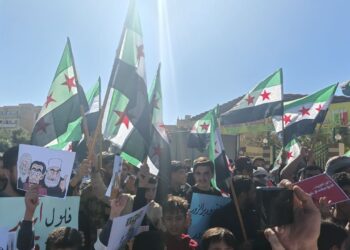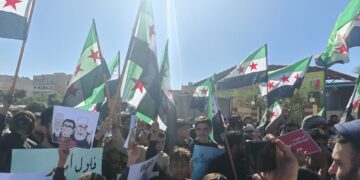This post is also available in:
![]() العربية
العربية
ISIS prevents access to the regime-held districts of Deir Ezzor city, where hundreds of civilians are starving under siege imposed by the group. The Assad regime also prevents civilians from leaving and escaping the harsh conditions in its controlled areas in Deir Ezzor. As a result life has become like hell in the besieged districts, as civilians are suffering from severe shortage of food supplies and the rise of their prices, in case they are available in the ‘’markets’, in addition to the spread of infectious diseases.
The regime controls Al-Jura and Al-Qusour districts in Deir Ezzor city and Al-Harabish district adjacent to the Deir Ezzor military airport east the city, while ISIS controls the rest of the province. The situation in the regime-held areas is as worse as in the areas under ISIS control. Random arrests, deprivation and death are common points between both parties. The people of Deir Ezzor who are caught between ISIS and regime atrocities are the only victims of the siege.
A gradual siege against the people of Deir Ezzor
The civilians living in the regime-held districts in Deir Ezzor have been subjected to multiple siege imposed by both of ISIS and the Assad regime since 01/15/2015. According to the Syrian Red Crescent statistics, around 200 thousand civilians, half of them women and children, are living in the besieged neighbourhoods.ISIS imposed a siege on the regime-held areas in Deir Ezzor to put pressure upon it in preparation to storm and conquer the whole province.
The ISIS siege in Deir Ezzor went through different stages. At first, the group prevented women from entering the regime-held areas in Deir Ezzor on the pretext that they are areas under the control of kuffars and apostates. After that, ISIS began preventing men from entering those areas (regime-held neighbourhoods in Deir Ezzor) under the excuse that they deliver reports on ISIS’ movements to the regime. Ultimately, the group prevented entry of food in any way to attain its full siege upon the regime in Deir Ezzor.
Nowadays, ISIS allows entry of civilians, escaping the besieged districts, after they complete a number of official documents recognized by the group.
The civilians had used both of water and overland passageways to leave and escape the besieged districts in Deir Ezzor before. The passageway of Ayash was the most important one. The civilians who could not reach Ayash passageway had to use boats to cross the Euphrates River to reach the village of Al Junayna. The civilians had to repeat this for 4 months to escape the ISIS-led blockade. The regime began to prevent civilians from fleeing its held areas for fear of being left alone. It set up checkpoints in areas it controls and imposed fees estimated at 25 thousands Syrian liras for each civilian who wants to escape the siege. It also issued a ruling that prevents 1636 teachers, who left the regime-held districts, from being paid only in case of their return.
Escaping a tragic reality
The harsh conditions of living under siege pushed civilians to search for smugglers in order to escape the regime-controlled parts of Deir Ezzor. Ahmed, an ex-smuggler, says: ‘’we (the smugglers) did not ask for high amounts of money when helping civilians, living under the siege, to escape. We always had to bribe a number of Assad forces when smuggling people from the besieged neighbourhoods, and they (Assad forces) are the ones who always asked us for a large amount of money to keep an eye blind to our activities for a couple of minutes”. He adds ‘’ I had to quit my job after a group of Assad forces fired bullets at families, whom they allowed to pass. It was like a game to them, and there was no one who could hold them responsible for their actions’’
The situation had continued for seven months and after that, the regime began to give security approvals to civilians who want to leave the districts. Brigadier, Mohamed Khadur, took advantage of this and started selling the security approvals at high prices, which jumped up from 25 to 150 thousands Syrian liras.Concerning those who want to leave via plane, they must pay around 250 thousands Syrian liras for their flight.Men, whose ages range from 16 to 45 years old, are still not allowed to leave the regime-held neighbourhoods in Deir Ezzor city. The only case in which the men, including those required for military services, are given the permission to leave is on conditions that they pay around 500 thousands Syrian liras.
ISIS harrasement
The ISIS’ checkpoint named Ayn Abu Jamaa’, is the first checkpoint the civilians escaping the regime-held neighbourhoods pass through.Abu Abdul Rahman, ISIS member from the village of al Husayniya and the one in charge of Ayn Abu Jamaa’ checkpoint in Deir Ezzor, always harasses women and children who pass through the checkpoint while escaping the siege. He often accuses women of illegal sexual intercourse with regime’s officers. ISIS police transport the civilian they arrest at the checkpoint to prisons.
Families who are accompanied by a man are released by the group while women who travel without Mahram, an unmarriageable kin with whom sexual intercourse would be considered incestuous, a punishable taboo, are transferred to ISIS Hisba-run prisons.
The regime has also played a major role in the killing of civilians in Deir Ezzor, by refusing several requests of the Red Cross to use the military airport for the delivery of humanitarian aid. Although the regime has reversed its decision recently and allowed the Red Cross to enter food shipment containing 10 tons of rice and 10 tons of ghee on 04/13/2015, this amount remains insufficient for even 20 percent of the civilians living under siege in the city. Deir Ezzor 24 contacted one activist who spoke on the condition of anonymity and said that there was a significant coordination between ISIS and the regime in the last August, which ended by mutual agreement on the entry of food and livestock, to the western rural areas and the besieged neighbourhoods in Deir Ezzor, at high price.Faysal Al-Huwaydi, aka ‘’ Kanash’’, who is the right arm of the head of the military security, Mazen al Kanj, was the one who coordinated with ISIS.
Many have taken the siege imposed on Deir Ezzor as a source of livelihood.
The commander of the military operations in the eastern region (al Sharqiya), brigadier Khadur, has recently announced his support for the commerce and merchants in the areas of Deir Ezzor subjected to his control. He facilitates the movements of three of the largest merchants in the eastern region from Deir Ezzor to Damascus, through military transport aircraft to load their commercial goods and then sell them in the markets of the besieged city of Deir Ezzor. Each of them gets his share in the end. Brigadier, Muhamed Khadur, has recently helped a merchant named Said al Ashraf aka ‘’Abi Said’, who is one of the biggest merchants in Deir Ezzor province as well, by providing him with facilities to transport his goods from Damascus to the besieged city of Deir Ezzor via the regime’s military transport aircraft. Mohamed Khadur earns profits estimated at billions of Syrian liras in return.
Efforts to lift the siege
Ali al Rahbi, one of the founders of Observatory of Justice for life in Deir Ezzor, which launched a media campaign to make the voices of the besieged civilians, in Deir Ezzor, heard, spoke to Deir Ezzor about the situation of services in those areas. He said: ‘’ the besieged neighbourhoods in Deir Ezzor city are supplied with water for a couple of hours every two days. The water is full of dust and its does not reach all of the neighbourhoods, which pushes the civilians to buy water from tankers that sell 200 litres of water with 500 Syrian liras. The areas have been suffering from power outages since 03.25.2015 coincided with the regime showing no intention to fix it.
Fuel prices have remained high and they are as follow:
The price of gasoline per litre: 3.500 Syrian liras
The price of diesel per litre: 900 Syrian liras
The price of gas per litre: 850 Syrian liras
Regarding the medical situation in the besieged districts, Ali al Rahbi said that there is a complete absence of basic medical care and medicines, therefore, some merchants have taken advantage of the situation by bringing medicines from outside to resell them at high prices to the few remaining pharmacies in Deir Ezzor. According to Observatory of Justice for life in Deir Ezzor, seven civilians, among them two children and two women, died from malnutrition and hunger this month. The death toll of the civilians who died from malnutrition and hunger in the besieged neighbourhoods of Deir Ezzor have reached 20 civilians, most of whom were children.
Concerning the security situation, Ali al Rahbi said that the national defence militia seized several cars belonging to civilians in the besieged neighbourhoods to use them for their military and personal activities. The regime also carried out mass campaign of arrests during which civilians, whose age range from 18 to 42, were forcibly conscripted.
In the second anniversary of the siege imposed upon the civilians living in the regime-held areas in Deir Ezzor, the reality seems to have changed for the worst while the future in the people’s eyes seems to be dark and gloomy.










